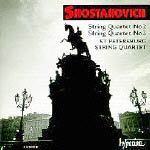
String Quartets Nos 2 & 3
 $30.00
Out of Stock
$30.00
Out of Stock6+ weeks add to cart
SHOSTAKOVICH
String Quartets Nos 2 & 3
St Petersburg String Quartet
[ Hyperion / CD ]
Release Date: Wednesday 15 November 2000
This item is currently out of stock. It may take 6 or more weeks to obtain from when you place your order as this is a specialist product.
'Deserves an emphatic recommendation and makes one impatient for the ensemble's next Shostakovich disc' (BBC Music Magazine)
'One of the finest chamber recordings of any genre I've heard all year and one that catches the idiom of the music in near-definitive terms. Superbly played and engineered, it's a magnificent beginning to what promises to be a must-hear series' (The Independent on Sunday)
'It is high time that a younger generation of Russian string players should tackle this key oeuvre of 20th-century chamber music, and in the St Petersburg Quartet we surely have the natural successors to the Borodin's crown. These virtuosic and sumptuous-toned accounts of the A and F major quartets easily rival the quasi-orchestral sonority the older quartet brought to this music and they are no less adept at mining the profound melancholy that pervades Shostakovich's great, lamenting slow movements and the mordant, sardonic wit of his parodistic waltzes and scherzos. A dazzling debut' (The Sunday Times)
'Deserves an emphatic recommendation and makes one impatient for the ensemble's next Shostakovich disc' (BBC Music Magazine)
'An edge-of-the-seat experience as this Russian quartet hurls itself headlong into the scores' (BBC Music Magazine)
This is the first of what will be the entire set of Shostakovich Quartets recorded by the St Petersburg String Quartet on Hyperion. Shostakovich wrote his first string quartet in 1938, with No 2 following six years later in 1944 (three weeks after the completion of his Piano Trio). The Piano Trio and String Quartet No 2 appear, emotionally, to be the obverse of the same coin and although the Quartet contains structural elements such as found in the Piano Trio, it stands entirely on its own as a wholly convincing work of art.
Having achieved a unique mastery of quartet-writing in No 2, by 1946 Shostakovich tackled the medium again. Also by this time, he had successfully tackled a formal challenge which had long fascinated Beethoven - the joining-together of movements of different character, yet done in such a way as to make their continuation both seamless and inevitable. Shostakovich had done this in the Eighth and Ninth Symphonies, as well as in the Piano Quintet and Piano Trio, but had not thus far attempted it in quartet writing. The Quartet No 3, which is in some respects superficially akin to the Ninth Symphony, revealed new facets of this great composer's compositional mastery, and plumbed considerable depths for Shostakovich than before in this medium.
'It is high time that a younger generation of Russian string players should tackle this key oeuvre of 20th-century chamber music, and in the St Petersburg Quartet we surely have the natural successors to the Borodin's crown. These virtuosic and sumptuous-toned accounts of the A and F major quartets easily rival the quasi-orchestral sonority the older quartet brought to this music and they are no less adept at mining the profound melancholy that pervades Shostakovich's great, lamenting slow movements and the mordant, sardonic wit of his parodistic waltzes and scherzos. A dazzling debut' (The Sunday Times)
'Deserves an emphatic recommendation and makes one impatient for the ensemble's next Shostakovich disc' (BBC Music Magazine)
'One of the finest chamber recordings of any genre I've heard all year and one that catches the idiom of the music in near-definitive terms. Superbly played and engineered, it's a magnificent beginning to what promises to be a must-hear series' (The Independent on Sunday)
'An edge-of-the-seat experience as this Russian quartet hurls itself headlong into the scores' (BBC Music Magazine)
Tracks:
xx
String Quartet No 2 in A major Op 68 (1944)
Overture [8'44]
Recitative and Romance [8'55]
Waltz [6'10]
Theme and Variations [10'59]
String Quartet No 3 in F major Op 73 (1946)
Allegretto [6'58]
Moderato con moto [4'52]
Allegro non troppo [3'52]
Adagio - [5'25]
Moderato [10'38]